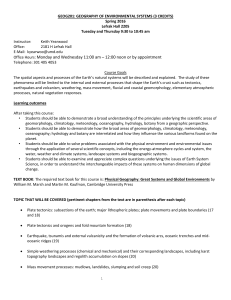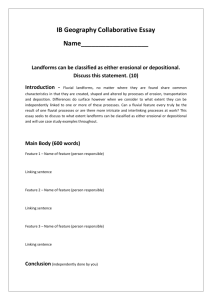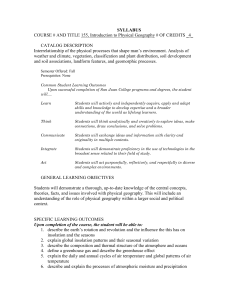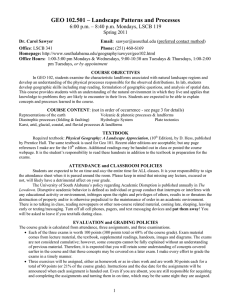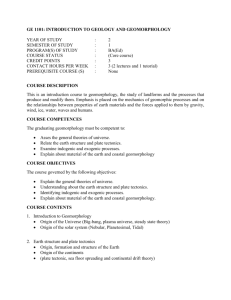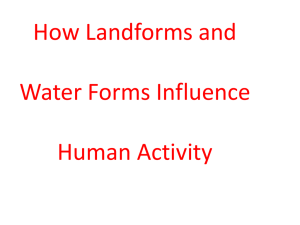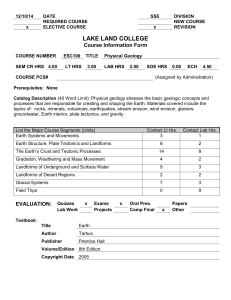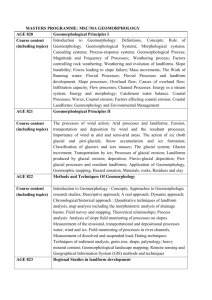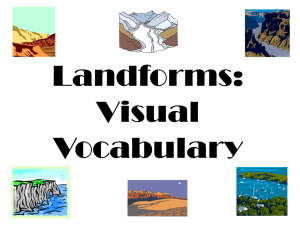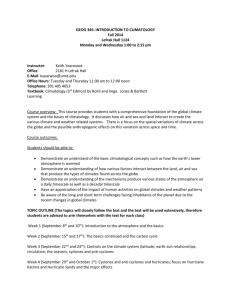Syllabus - University of Maryland
advertisement
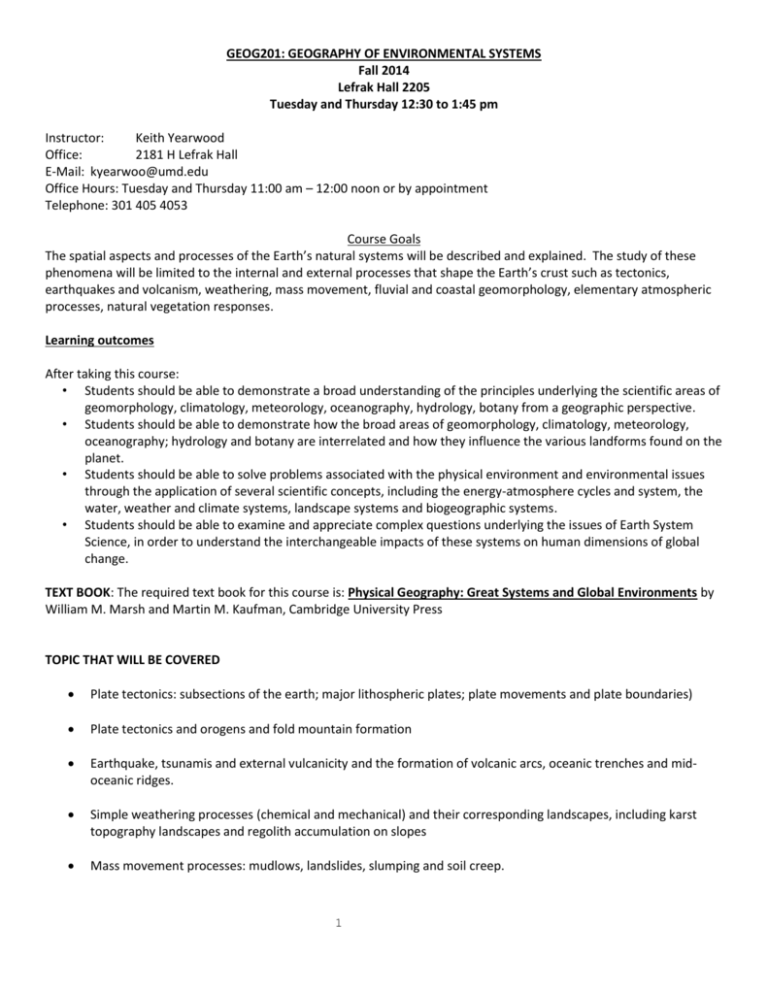
GEOG201: GEOGRAPHY OF ENVIRONMENTAL SYSTEMS Fall 2014 Lefrak Hall 2205 Tuesday and Thursday 12:30 to 1:45 pm Instructor: Keith Yearwood Office: 2181 H Lefrak Hall E-Mail: kyearwoo@umd.edu Office Hours: Tuesday and Thursday 11:00 am – 12:00 noon or by appointment Telephone: 301 405 4053 Course Goals The spatial aspects and processes of the Earth’s natural systems will be described and explained. The study of these phenomena will be limited to the internal and external processes that shape the Earth’s crust such as tectonics, earthquakes and volcanism, weathering, mass movement, fluvial and coastal geomorphology, elementary atmospheric processes, natural vegetation responses. Learning outcomes After taking this course: • Students should be able to demonstrate a broad understanding of the principles underlying the scientific areas of geomorphology, climatology, meteorology, oceanography, hydrology, botany from a geographic perspective. • Students should be able to demonstrate how the broad areas of geomorphology, climatology, meteorology, oceanography; hydrology and botany are interrelated and how they influence the various landforms found on the planet. • Students should be able to solve problems associated with the physical environment and environmental issues through the application of several scientific concepts, including the energy-atmosphere cycles and system, the water, weather and climate systems, landscape systems and biogeographic systems. • Students should be able to examine and appreciate complex questions underlying the issues of Earth System Science, in order to understand the interchangeable impacts of these systems on human dimensions of global change. TEXT BOOK: The required text book for this course is: Physical Geography: Great Systems and Global Environments by William M. Marsh and Martin M. Kaufman, Cambridge University Press TOPIC THAT WILL BE COVERED Plate tectonics: subsections of the earth; major lithospheric plates; plate movements and plate boundaries) Plate tectonics and orogens and fold mountain formation Earthquake, tsunamis and external vulcanicity and the formation of volcanic arcs, oceanic trenches and midoceanic ridges. Simple weathering processes (chemical and mechanical) and their corresponding landscapes, including karst topography landscapes and regolith accumulation on slopes Mass movement processes: mudlows, landslides, slumping and soil creep. 1 Fluvial processes and landforms: erosional, depositional processes and landforms, depositional features, cut offs, cut banks and point bars; river migration Coastal geomorphic processes and landforms: wave formation and waves of erosion and deposition; beach environments and headland development (caves, arches, stacks and stumps); swash and backwash; longshore drift and formation of spits and bars Solar energy to the earth and the seasons: shortwave and longwave radiation and temperature of the Earth’s lower atmosphere; greenhouse gases and temperature; revolution and the four seasons. Earth’s modern atmosphere and characteristics of the weather and the factors determining the weather (including atmospheric pressure, winds, clouds, altitude, relief, types of rainfall, etc.) Natural vegetation response to climate regimes (tropical equatorial, boreal and broad leaf temperate forests, tundra, savanna grasslands, Mediterranean. Tropical and temperate deserts); mechanisms used by these natural vegetation types in their adaptations to their respective climates Email: Please if you send an email to the Instructor regarding Geog 201 please put in the subject Geog 201 for a quicker response. Students with special needs - I will make every effort to accommodate students who are registered with the Disability Support Services (DSS) Office and who provide me with a University of Maryland DSS Accommodation form which has been updated for the Fall semester. This form must be presented to me no later than September 15. I am not able to accommodate students who are not registered with DSS or who do not provide me with documentation which has been reviewed by DSS after September 15 Disruptive Students: Students are expected to treat each other with respect. Disruptive behavior of any kind will not be tolerated. Students who are unable to show civility with one another, the teaching assistants, or myself will be subject to being referred to the Office of Student Conduct or to Campus Police. You are expected to adhere to the Code of Student Conduct.” Religious Observance: By September15, students must provide via email a request for a make up exam if I have indicated a date on this syllabus that you are unable to make due to a specific religious observance (specify) on a specific date. Please refer to the Online Undergraduate Catalog Policy on Religious Observance. Attendance: Attendance is strongly advised at the lecture since questions on the exams will come from lecture material, films, and reading assignments. Campus Senate policy requires students who are absent due to illness/injury to furnish documentary support to the instructor. I require students to contact me by email or by phone prior to class time in which you indicate that you have an illness or an injury. You must provide written documentation verifying your illness/injury immediately upon your return to class. You will not be allowed to turn in missed assignments or make up quizzes, tests, papers, etc. if you have not provided this documentation. Documentation not presented to me in a timely manner will not be accepted. In addition, if it is found that you have falsified the documentation provided, I will refer you to the University’s Student Conduct Office. Academic integrity: Academic dishonesty is a serious offence that can result in suspension or expulsion from the University of Maryland. All assignments should be your own work. Since there are several writing assignments, 2 plagiarism would not be tolerated. Please refer to the following website to determine how the University of Maryland defines plagiarism: http://www.testudo.umd.edu/soc/dishonesty.html. Assessment and grading: There will be THREE exams. While each exam may not have the same number of questions, each is worth 33 percent of the final grade. Each student will be given 1 percent to their final tally to achieve a round 100 percent. The exams are non-cumulative. A note on querying exam scores: Students are free to query their exam scores under the following conditions: You cannot query scores from a previous exam after a second exam is given, etc. Your window of opportunity therefore lasts from the end of the exam until the time the next one is given. Final letter grades will be broken down the following way: 96 – 100 92 – 95 90 – 91 88 – 89 82 – 87 80 – 81 78 – 79 72 – 77 70 – 71 60 – 69 Less than 60 A+ A AB+ B BC+ C CD F Dates for the exams: Exam 1: Thursday October 2nd Exam 2: Thursday November 13th Exam 3: To be determined PLEASE BE ADVISED THAT THE MATERIAL OUTLINED IN THE SYLLABUS, INCLUDING DATES FOR EXAMS ARE SUBJECT TO CHANGE IN ACCORDANCE WITH THE OCCURRENCE OF SPECIAL CASES AND EVENTS. 3

